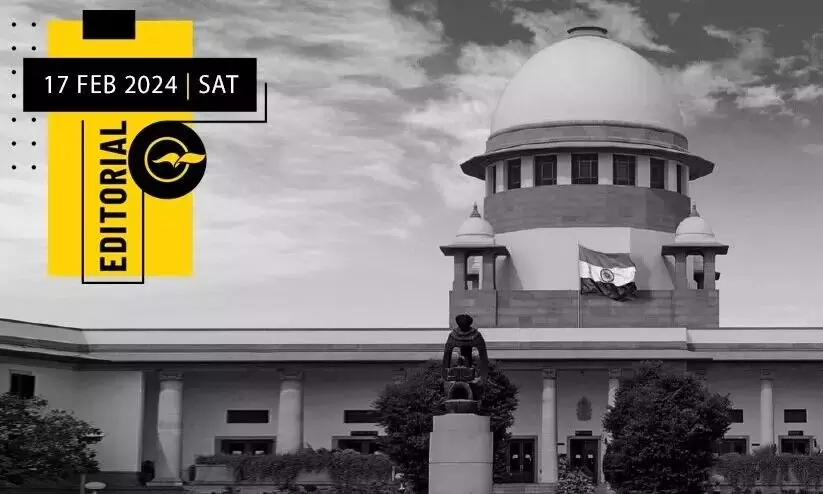
Supreme Court’s correction for systematic corruption
text_fieldsThe Supreme Court bench's order to strike down the electoral bond scheme as unconstitutional can be seen as one of the most decisive interventions in recent Indian judicial history. When the scheme was introduced by the Modi government, many critics had argued that it would strengthen the influence of corporates and the ultra-rich in government. Despite widespread criticism, the first Modi government, using its brute majority in Parliament, pushed through this anti-democratic system, even repealing citizens' fundamental right to know. Shortly after its implementation, the scheme's legality was challenged in the Supreme Court. The matter was subsequently referred to a Constitution Bench for consideration, headed by Chief Justice D.Y. Chandrachud. In its recent verdict, the bench reiterated the criticisms, highlighting the lack of transparency in the scheme and its infringement of citizens' right to know who is donating to political parties. This ruling deals a literal blow to the Modi government's authoritarian tendencies. Furthermore, following the verdict, there may be an opportunity to identify the sources of the over 6,000 crore rupees that have flowed into the BJP's coffers over the last six years.
 Also Read: Centre’s Electoral Bonds Scheme fails Constitutional validity test in SC
Also Read: Centre’s Electoral Bonds Scheme fails Constitutional validity test in SC
The idea of electoral bonds was first announced by the then Finance Minister Arun Jaitley in his 2017 budget speech, with the stated objective of curbing the flow of black money into political parties. Within a year, a notification was issued to implement this scheme. Under this system, individuals and institutions can purchase bearer bonds from the State Bank of India (SBI) and donate them to any political party of their choice. The parties can then encash these bonds for funds, with only the requirement to declare the details of donations received to the Election Commission of India on an annual basis. While this may initially appear to be a transparent system, in reality, it provides a platform for institutionalized corruption. The well-known fact of corporate influence in Indian politics, with occasional headlines and controversies surrounding their power in elections and governance, is further exacerbated by the Modi government's introduction of the electoral bond scheme. This system, which shields the identities of donors from public knowledge, perpetuates the anonymity of powerful forces behind the ruling establishment. And in order to facilitate this, several changes were made to existing laws, most notably through the Finance Act of 2017. According to the Representation of the People Act, parties were required to record and pay income tax on any donation exceeding ₹20,000. This requirement was abolished with the introduction of electoral bonds. Under the Companies Act, the maximum donation that a company could make to political parties was limited to 7.5% of its average profit for the previous three financial years. However, with the introduction of electoral bonds, this limit was abolished, allowing companies to donate any amount they desired without restrictions. In other words, a shell company could be set up, and any amount of money could be donated to the political parties of its choice through electoral bonds, with the details of these transactions not being there in the public domain. Naturally, the main beneficiaries of these transactions would be the ruling party. This is further evidenced by the figures for the last five years, where more than 60% of the money that has flowed through electoral bonds has gone to the BJP. This represents the amount that the party has managed to raise through systematic money laundering and corruption. The Supreme Court has now put a stop to this institutionalized corruption.
 Also Read: Electoral Bond yields Rs 16,517 Crore: BJP leads beneficiaries
Also Read: Electoral Bond yields Rs 16,517 Crore: BJP leads beneficiaries
Although an opaque system resulting in an out-of-the-way nexus between corporates and political parties has been nullified, it is unlikely that this will eliminate the influence of big money in elections and governance in toto. The central government's response to the Supreme Court verdict remains to be seen, especially in light of the possibility of a review petition. Additionally, the Supreme Court verdict has created some legal complications. The Court has also struck down the amendments made to the law regarding electoral bonds. In the current situation, the government does not have the power to promulgate an ordinance to overcome these complications. Moreover, the Election Commission and SBI are likely to disclose details of the bonds within two weeks. This may not be in the best interests of the BJP. Therefore, it remains to be seen what strategy the Centre will adopt to overcome all this. Above all, the Supreme Court's intervention reminds us that there is still a lack of transparent laws on election fund collection and utilization. The Court has only put a spotlight on the problem; the solution is still far away.























